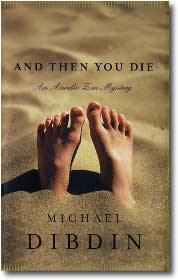"And Then You Die"
(Reviewed by Bill Robinson AUG 1, 2002)
 "Aurelio
Zen was dead to the world. Under the next umbrella, a few desirable metres
closer to the sea, Massimo Rutelli was just dead." With
this, author Michael Dibdin begins And Then You Die, the latest
outing for Italian police detective Aurelio Zen. It is an opening to keep
crime and mystery fans reading. However, holding the reader's attention
is never a real problem in this well-crafted, highly entertaining chronicle
of the world-wise, Venice-born detective's latest adventures.
"Aurelio
Zen was dead to the world. Under the next umbrella, a few desirable metres
closer to the sea, Massimo Rutelli was just dead." With
this, author Michael Dibdin begins And Then You Die, the latest
outing for Italian police detective Aurelio Zen. It is an opening to keep
crime and mystery fans reading. However, holding the reader's attention
is never a real problem in this well-crafted, highly entertaining chronicle
of the world-wise, Venice-born detective's latest adventures.
![]() This is the
eighth book in Dibdin's Aurelio Zen series. Readers not familiar with
Zen's often intricate investigations, his wry wit, and his frequent near-death
experiences will find this novel a perfect introduction to the labyrinthian
intricacies of Italian crime and law enforcement. Readers of Blood
Rain, the last Zen mystery, will find it a highly satisfying sequel
to that complex and satisfying work.
This is the
eighth book in Dibdin's Aurelio Zen series. Readers not familiar with
Zen's often intricate investigations, his wry wit, and his frequent near-death
experiences will find this novel a perfect introduction to the labyrinthian
intricacies of Italian crime and law enforcement. Readers of Blood
Rain, the last Zen mystery, will find it a highly satisfying sequel
to that complex and satisfying work.
And Then You Die is a clever twist on the usual police procedural. In this case, the tables are turned: the detective is the hunted, rather than the hunter.
Zen, a member of Rome's elite Criminapol, is slowly recuperating from major injuries sustained in Sicily when a bomb exploded a car in which he was a passenger. All signs point to one of the numerous, always-feuding mafioso clans as responsible.
Zen has been ordered by his superiors to rest and keep a low profile while awaiting a trip to the U.S. where he is to be a surprise and key witness in a major Mafia trial. He bides his time in Versilia, a small, quiet Tuscan seaside resort. He is advised to blend in with others on holiday. This forces him to spend four or five hours each day sitting on the beach in a lounge chair under an umbrella contemplating sea and sand.
However, after three months, this seemingly idyllic lifestyle begins to bore Zen, who is ever on the lookout for lurking danger and actions nefarious.
"Everything was clean, neat and safe, a privileged enclave where the normal chaos theory of Italian urban life was inverted. Zen had initially found it charming, just what he needed in his prolonged convalescence," Dibdin writes, "but now it was starting to grate on him. There was no edge, no friction, no coefficient of resistance. There were moments when he had to curb the urge to start behaving badly, just to stir things up a little."
Any such overt action becomes unnecessary as an unnatural demise comes to one person, then another in Zen's immediate vicinity. It is found that Massimo Rutelli, Zen's once dozing, now dead beach mate, took a bullet to the heart from a nine-millimeter pistol with silencer. Rutelli had been occupying Zen's assigned beach chair. Similar occurrences lead Zen quickly to conclude that he is high on someone's hit list.
The leisurely plot, with regular digressions concerning Italian life and mores, slowly thickens. Rather than spoiling its twists and turns, suffice it to say that Zen finds that he no longer needs to testify in the U.S. He returns to Rome where a new chief gives him a pay raise and a vague assignment to establish a "special unit" within Criminapol. He will have total autonomy, no colleagues, and it won't be necessary that he even come in to work.
Zen, a chronic paranoid, realizes that his new job must be some sort of bureaucratic stratagem. Perhaps, forces high up in the government want to get him out of the way for reasons unknown. However, there is little he can do but comply. He is still in danger, still being hunted, and his suspicions make him reluctant to confide in his superiors.
With his new found "official" freedom, Zen packs his bags and returns to the Tuscan beach to rendezvous with Gemma, an attractive woman, "mature" like himself, whom he met during his earlier stay. Suddenly, with Gemma in tow, the action, in what has been a meandering narrative, kicks in, and the novel dashes to an almost James Bondian conclusion.
Dibdin has a cool charismatic character in Zen. He is an observer who watches careful while always staying above the fray. Zen is a loner, a philosopher, and a cynic. "One can never be too cynical," he tells a friend. His mind works in "a facetious, allusive way, but its insights usually turned out to (be) correct."
English author Michael Dibdin spent a number of years in Italy, and the book often seems an Italian Rough Guide with off-the-beaten-track insights into culture, regions, food, and people. The country is more than a backdrop. It is a lively and active participant in the story.
One caveat: And Then You Die is somewhat slim in comparison with other thrillers in the Zen series. It is shorter and more compact, perhaps, than loyal readers may have come to expect. In that sense, it is akin to a novella, rather than a full-fledged novel. However, its brevity may actually entice new readers, intrigued and looking for more, to join the Zen fan club and seek out earlier episodes, those with greater complexity and depth. They won't be disappointed.
- Amazon
readers rating:
 from 13 reviews
from 13 reviews
(back to top)
Bibliography: (with links to Amazon.com)
Aurelio Zen Mysteries:
- Ratking (1988)

- Vendetta (1990)
- Cabal (1992)
- Dead Lagoon (1994)
- Cosi Fan Tutti (1996)
- Long Finish (1998)
- Blood Rain (2000)
- And Then You Die (May 2002)
- Medusa (February 2004)
- Back to Bologna (January 2005)
- End Games (August 2007)
Other:
- The Last Sherlock Holmes Story (1978)
- The Tryst (1989)
- Dirty Tricks (1991)
- The Dying of Light (1993)
- Dark Specter (1995)
- A Rich, Full Death (1999)
- Thanksgiving (2001)
(back to top)
Book Marks:
- January Magazine page on Michael Dibdin
- Crime Time interview with Michael Dibdin
- Vintage Crime/Black Lizard site on Michael Dibdin's novels
- Book Page review of Dark Specter
- Printed Matter review of Dead Lagoon
- Guardian Unlimited review of Thanksgiving
- Guardian Limited review of And Then You Die
- Guardian Unlimited review of Medusa
- Italian Mysteries review of Back to Bologna
- Guardian Unlimited review of Back to Bologna
(back to top)
About the Author:
 Michael
Dibdin was born in Wolverhampton, England in 1947. His family moved around
the British Isles extensively and thus he attended schools in Scotland
and Ireland and universities in England and Canada where he earned degrees
in English literature. He spent five years in Canada as a painting contractor
and another five in Perugia, Italy and became an English teacher and taught
at the University of Perugia. In 1995, he moved to Seattle, Washington
where he and his third wife, the writer Katherine Beck, live with some
of their five children, two of which are his daughters from previous marriages.
Michael
Dibdin was born in Wolverhampton, England in 1947. His family moved around
the British Isles extensively and thus he attended schools in Scotland
and Ireland and universities in England and Canada where he earned degrees
in English literature. He spent five years in Canada as a painting contractor
and another five in Perugia, Italy and became an English teacher and taught
at the University of Perugia. In 1995, he moved to Seattle, Washington
where he and his third wife, the writer Katherine Beck, live with some
of their five children, two of which are his daughters from previous marriages.
His first book was a Sherlock Holmes pastiche but he earned greater consideration with the introduction of Italian cop Aurelio Zen in the first of the series Ratking that won the Gold Dagger in 1988. The second, Vendetta, won the CWA 1992 Award in 1990. The series is translated into 16 languages (including Italian). His novel Cabal was awarded the French Grand Prix du Roman Policier.
Michael Dibin died on March 30, 2007 at the age of 60.

